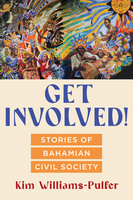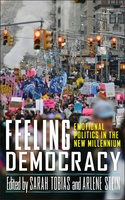
Bold Ideas, Essential Reading since 1936.
Rutgers University Press is dedicated to the advancement and dissemination of knowledge for a wide range of readers. The Press reflects and extends the University’s core mission of research, instruction, and service. They enhance the work of their authors through exceptional publications that shape critical issues, spark debate, and enrich teaching. Core subjects include: film and media studies, sociology, anthropology, education, history, health, history of medicine, human rights, urban studies, criminal justice, Jewish studies, American studies, women's, gender, and sexuality studies, LGBTQ, Latino/a, Asian and African studies, as well as books about New York, New Jersey, and the region.
Rutgers also distributes books published by Bucknell University Press.
My Race Is My Gender
Portraits of Nonbinary People of Color
My Race is My Gender is the first anthology by nonbinary writers of color to include photography and visual portraits, centering their everyday experiences of negotiating intersectional identities. Bringing together Black, Indigenous, Latine, and Asian perspectives, its six contributors share their personal stories of working for racial justice and the recognition of queer gender identities.
Locker Room Talk
A Woman’s Struggle to Get Inside
Melissa Ludtke offers a compelling account of her courtroom quest to do what her male sportswriter colleagues took for granted: to talk with players in Major League Baseball’s locker rooms. She reveals how, as a 26-year-old woman, she took MLB Commissioner Bowie Kuhn to federal court—and won.
Alien Soil
Oral Histories of Great Migration Newark
The Georgia of the North
Black Women and the Civil Rights Movement in New Jersey
Soviet-Born
The Afterlives of Migration in Jewish American Fiction
Latin* Students in Engineering
An Intentional Focus on a Growing Population
Latin* Students in Engineering examines the state of Latin* engineering education at present as well as considerations for policy and practice regarding engineering education aimed at enhancing opportunity and better serving Latin* students. The essays in this volume first consider, theoretically and empirically, the experiences of Latin* students in engineering education and then expand beyond the student level to focus on institutional and social structures that challenge Latin* students' success and retention.
Film Noir and the Arts of Lighting
An Ordinary Landscape of Violence
Women Loving Women in Guyana
Smoothing the Jew
"Abie the Agent" and Ethnic Caricature in the Progressive Era
Intelligent Action
A History of Artistic Research, Aesthetic Experience, and Artists in Academia
Home Is Where Your Politics Are
Queer Activism in the U.S. South and South Africa
Get Involved!
Stories of Bahamian Civil Society
Feeling Democracy
Emotional Politics in the New Millennium
Cruel Destiny and The White Negress
Two Novels by Cléante Desgraves Valcin
Criminalized Lives
HIV and Legal Violence
Criminalized Lives profiles people charged in Canada with the crime of not disclosing their HIV-positive status to sex partners. Examining how criminalization disproportionately punishes poor, Black and Indigenous people, gay men, and women in Canada, Alexander McClelland investigates the consequences of criminalizing illness, which results in people being subjected to state violence rather than treated with care.
Brotherhood University
Black Men's Friendships and the Transition to Adulthood
American Anti-Pastoral
Brookside, New Jersey and the Garden State of Philip Roth
The Specter and the Speculative
Afterlives and Archives in the African Diaspora
The Specter and the Speculative
Afterlives and Archives in the African Diaspora
Wake
Why the Battle over Diverse Public Schools Still Matters
Wake: Why the Battle Over Diverse Public Schools Still Matters tells the story of the aftermath of the 2009 Wake County school board election in favor of "neighborhood schools," including the fierce public debate that ensued during school board meetings and in the pages of the local newspaper, and the groundswell of community support that voted in a pro-diversity school board in 2011. What was at stake in those years was the fundamental direction of the largest school district in North Carolina and the 14th largest in the U.S. Would it maintain a commitment to diverse schools, and if so, how would it balance that commitment with various competing interests and demands? Through hundreds of published opinion articles and several in depth interviews with community leaders, Wake examines the substance of that debate and explores the community’s vision for public education.
















